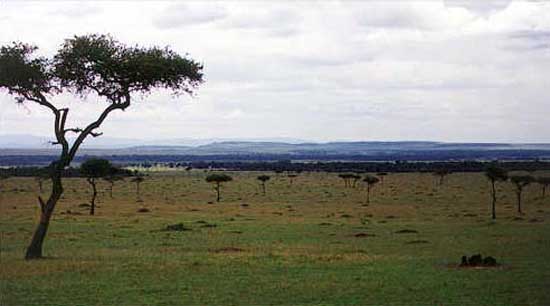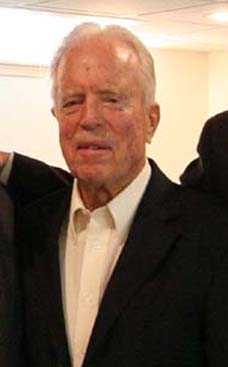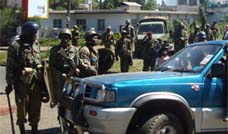
The school we have helped build and support for the past seven years - we know the children, we have met the teachers, our friends of long-standing started the school - sits in a little village right on one of the ethnic borders. With horror, I read online last week that tiny Chepalat (so small it isn't on aGoogle map) was the latest scene of thuggery. Eight people were killed, and a hundred houses went up in smoke, razed by youths armed with bows and arrows. We called to find out the fate of the school. It has been spared. The school was threatened by arsonists, and our friend hired armed guards to keep watch over it. But he has sent the children home, if they have homes to go to. Kenya is now so dangerous that our cherished Peace Corps has withdrawn all volunteers. The Red Cross reports that 1,000 Kenyans have been killed in the past six weeks, and 300,000 have been displaced. I want to get on a plane and fly there tomorrow. But I know that if I go, there will be just one more person for my family to worry about. I know my friends there will be burdened by my presence. There isn't much I can do but let my Kenyan friends know I care deeply about them. I also know that one day the violence will pass, and people will return to their ordinary lives. My wife and I will continue raising money to sustain the school that so far remains standing. We will help to provide a real education for 350 children, not from one ethnic group but from several. And we will continue to believe that these children, having been educated in an atmosphere of tolerance, someday will be able to find better ways to bring justice to a land that sorely is in need.
Kenya RPCV Arthur Dobrin writes: Blood on the postcard
Notebook: Blood on the postcard
BY ARTHUR DOBRIN |
Arthur Dobrin is a professor of humanities at Hofstra University and author of "Ethics for Everyone: How to Improve Your Moral Intelligence."
February 10, 2008
My wife and I love Kenya.
Is it because we were Peace Corps volunteers there in 1965, just out of college and newly married? Is it because we have had friends there for more than 40 years - generous and kind people? Is it because we have been there a dozen times since and now support a primary school 250 miles from the capital?
Perhaps it is because our son was born in Kenya, and our children attended a school in rural Kisii when they weren't yet 10. Maybe it is because my son married a Kenyan citizen, and I now have in-laws there.
Or do our hearts belong to Kenya because it is so beautiful that it defines postcard Africa - green and rolling hills, tea fields and savannah, snow-covered mountains and lakes pink from a million flamingos?
It is all these things. So it is with heartbreak that we read about the bloodletting and mayhem that have ripped Kenya apart since the disputed presidential election that took place soon after Christmas.
We call a friend in Nairobi and learn that he and his wife haven't been able to go to work. The streets are too dangerous. The shops are running low on provisions, and he is running out of money. Tourists have delayed their safaris, and there is no one to buy his stone sculptures.
We call him a few weeks later, and he says that he has sent his granddaughter upcountry, to Naivasha, so she could be safe, only to learn the next day that that town is the scene of recent killings. Telephone service has been disrupted. He can't reach her and is now more worried than ever.
Our friends are members of the Kisii ethnic group, and they are viewed as ardent supporters of PresidentMwai Kibaki. The groups that surround them supported Raila Odinga, the presidential rival who claims, with great merit, that the election was stolen. This means that the borders of Kisii are flash points of political and ethnic resentments that have their roots in colonialism and earlier.
Long before the British took control in 1885, East Africa wasn't a stable place, but a dynamic one, with people moving from place to place and engaging in battles and displacements along the way.
The Kisii migrated to their present homestead probably in the 1700s and had to fight for the land. As late as the early 20th century, they didn't see themselves as a unified group, and under colonial rule some clans lined up with the British while others resisted. This history is getting played out in the current violence, which is also connected to poverty and widespread political corruption.
The school we have helped build and support for the past seven years - we know the children, we have met the teachers, our friends of long-standing started the school - sits in a little village right on one of the ethnic borders. With horror, I read online last week that tiny Chepalat (so small it isn't on aGoogle map) was the latest scene of thuggery. Eight people were killed, and a hundred houses went up in smoke, razed by youths armed with bows and arrows.
We called to find out the fate of the school. It has been spared. The school was threatened by arsonists, and our friend hired armed guards to keep watch over it. But he has sent the children home, if they have homes to go to.
Kenya is now so dangerous that our cherished Peace Corps has withdrawn all volunteers. The Red Cross reports that 1,000 Kenyans have been killed in the past six weeks, and 300,000 have been displaced.
I want to get on a plane and fly there tomorrow. But I know that if I go, there will be just one more person for my family to worry about. I know my friends there will be burdened by my presence. There isn't much I can do but let my Kenyan friends know I care deeply about them.
I also know that one day the violence will pass, and people will return to their ordinary lives. My wife and I will continue raising money to sustain the school that so far remains standing. We will help to provide a real education for 350 children, not from one ethnic group but from several.
And we will continue to believe that these children, having been educated in an atmosphere of tolerance, someday will be able to find better ways to bring justice to a land that sorely is in need.










